AUGUST 2010 - DOWNLOAD ROUNDUP
Brian Wilson
Download of the Month
Antonín DVOŘÁK
(1841-1904)
Symphonic Poems
The Water Goblin, B195 [20:27]; The Noon Witch,
B196 [13:58]; The Golden Spinning Wheel, B197 [25:45];
The Wild Dove, B198 [19:35]
Czech Philharmonic Orchestra/Sir Charles Mackerras
rec. 14 June, 2001 (Golden Spinning Wheel), 11-12 December 2008
(Water Goblin, Noon Witch), 9-10 September 2009 (Wild Dove),
Rudolfinum, Prague, Czech Republic. DDD.
SUPRAPHON SU4012-2 [79:42] – from emusic
(mp3)
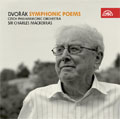 Sadly,
this will have to serve as a valedictory tribute to Sir Charles
Mackerras. (See MWI obituaries by Bill
Kenny and Brian
Reinhart, the latter incorporating a summary of his legacy
on disc by Rob Barnett.) It’s fitting that one of his last recordings
should be of Czech music, which he did so much to promote. For
all my love of Kubelík’s recordings of this repertoire
– I’m not about to ditch my 2-CD set of the Overtures and Tone
Poems, which has now been expanded to 3 CDs with the Slavonic
Dances, 469 3662, available from passionato
– I very largely agree with Brian Reinhart’s very detailed review,
to which I refer you – here.
I also agree with his praise of Mackerras’s recording of the
Sixth Symphony, from which The Golden Spinning Wheel
is taken – a shame about the duplication. I disagree only with
his suggestion that Kubelík is now easily dispensable.
Although all the tracks come at the bare minimum of 192k or
very little higher, the sound of the download is more than adequate.
Sadly,
this will have to serve as a valedictory tribute to Sir Charles
Mackerras. (See MWI obituaries by Bill
Kenny and Brian
Reinhart, the latter incorporating a summary of his legacy
on disc by Rob Barnett.) It’s fitting that one of his last recordings
should be of Czech music, which he did so much to promote. For
all my love of Kubelík’s recordings of this repertoire
– I’m not about to ditch my 2-CD set of the Overtures and Tone
Poems, which has now been expanded to 3 CDs with the Slavonic
Dances, 469 3662, available from passionato
– I very largely agree with Brian Reinhart’s very detailed review,
to which I refer you – here.
I also agree with his praise of Mackerras’s recording of the
Sixth Symphony, from which The Golden Spinning Wheel
is taken – a shame about the duplication. I disagree only with
his suggestion that Kubelík is now easily dispensable.
Although all the tracks come at the bare minimum of 192k or
very little higher, the sound of the download is more than adequate.
Reissue of the Month
Franz SCHUBERT (1797-1828)
Piano Quintet in A (‘Trout’), D667
Clifford Curzon (piano) and Members of the Vienna Octet: Willi
Boskovsky (violin), Gunther Breitenbach (viola), Nikolaus Hübner
(cello), Johann Krump (double bass) – rec. 1958. Stereo/ADD.
BEULAH EXTRA 1BX41 (mvt.1), 2BX41 (mvts. 2 and
3) and 3BX41 (finale) [35:10] – from Beulah
(mp3)
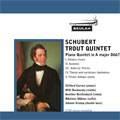 Of
making many Trout Quintets there is no end, but even
Ecclesiastes could never complain that this classic recording
could ever be wearisome to the flesh and we must be grateful
to Beulah for making it available again on its own at so reasonable
a price. The only other way to obtain it, apart from the box
set in which Decca have incarcerated it, is to download the
Eloquence CD, on which it is coupled with the Death and the
Maiden Quartet from Passionato (467 4172 – here).
Of
making many Trout Quintets there is no end, but even
Ecclesiastes could never complain that this classic recording
could ever be wearisome to the flesh and we must be grateful
to Beulah for making it available again on its own at so reasonable
a price. The only other way to obtain it, apart from the box
set in which Decca have incarcerated it, is to download the
Eloquence CD, on which it is coupled with the Death and the
Maiden Quartet from Passionato (467 4172 – here).
Both the Passionato and Beulah downloads come in 320k transfers
and both sound very little – if at all – inferior to my copy
of the CD. The Passionato costs £7.99, or £5.89 for the Quintet
alone, so the Beulah has a price advantage.
Other Beulah Extra Downloads
The road to Hell is paved with good intentions – one of
which, I fear, is my promise to complete an article devoted
to the Beulah Extra catalogue. I’ve been working on it for two
months now but the pressure of getting these Download Roundups
ready in time, as well as my usual CD, DVD and Blu-ray reviews,
means that I’ll have to take the proverbial rain check for another
month. In partial compensation, I’m grouping all the Beulah
Extra July releases together here.
Wolfgang Amadeus MOZART
(1756-1791)
Serenade No.13 in G, K525 (Eine kleine Nachtmusik)
Berlin Philharmonic Orchestra/Wilhelm Furtwängler – rec.1937.
Mono/ADD
BEULAH EXTRA 1BX31 [14:40] – from Beulah
(mp3)
Serenade No. 6 in D, K239 (Serenata Notturna) [14:45];
Serenade No.13 in G, K525 (Eine kleine Nachtmusik) [19:41];
Notturno in D for Four Orchestras, K286 (K269a) [17:06]; Divertimento
in F, K522 (A Musical Joke) [20:37]
Le Concert des Nations/Jordi Savall
ALIA VOX AVSA9846 [72:10] – from passionato
(mp3)
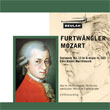 There’s
a real contrast of styles here. The 1938 Gramophone reviewer
thought the Furtwängler stylish and the 1937 recording
still stands up well – shapely and sprightly, with some really
delicate playing at times, and in a transfer that is more than
tolerable, with little or no 78 noise. This, or a slightly later
Furtwängler performance, was still available on a 7” mono
EP in the 1960s; I owned it, and I am very pleased to make its
acquaintance again. The quality of the direction should come
as no surprise to those who know – and admire, as I do – Furtwängler’s
recording of Haydn’s Symphony No.88. Comparing the 1931 recording
from the London Chamber Orchestra under Anthony Bernard, available
from the King’s CHARM project (see below), a very straight performance,
though not without its attractions, confirmed my high regard
for the Furtwängler performance and recording, as transferred
by Beulah.
There’s
a real contrast of styles here. The 1938 Gramophone reviewer
thought the Furtwängler stylish and the 1937 recording
still stands up well – shapely and sprightly, with some really
delicate playing at times, and in a transfer that is more than
tolerable, with little or no 78 noise. This, or a slightly later
Furtwängler performance, was still available on a 7” mono
EP in the 1960s; I owned it, and I am very pleased to make its
acquaintance again. The quality of the direction should come
as no surprise to those who know – and admire, as I do – Furtwängler’s
recording of Haydn’s Symphony No.88. Comparing the 1931 recording
from the London Chamber Orchestra under Anthony Bernard, available
from the King’s CHARM project (see below), a very straight performance,
though not without its attractions, confirmed my high regard
for the Furtwängler performance and recording, as transferred
by Beulah.
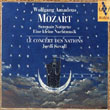 Terry
Barfoot gave a mixed welcome to the Savall – here
– offsetting the advantage of the period instruments and style
against the reverberant acoustic. I was far less troubled by
the acoustic and generally very pleased with the performances.
I’ve never heard such gloriously wrong horn notes, delivered
with such panache in the Musical Joke; too often performances
of this work leave the modern listener wondering what the joke
is.
Terry
Barfoot gave a mixed welcome to the Savall – here
– offsetting the advantage of the period instruments and style
against the reverberant acoustic. I was far less troubled by
the acoustic and generally very pleased with the performances.
I’ve never heard such gloriously wrong horn notes, delivered
with such panache in the Musical Joke; too often performances
of this work leave the modern listener wondering what the joke
is.
Così fan tutte Overture
Berlin Staatsoper Orchestra/Leopold Ludwig – rec.1938. Mono/ADD
BEULAH EXTRA 1BX4 [4:09] – from Beulah
(mp3)
Short and sweet, in decent sound, but hardly one of the highlights
of the Beulah catalogue.
Ludwig van BEETHOVEN (1770-1827)
The Creatures of Prometheus Overture
London Philharmonic Orchestra/Eduard van Beinum – rec.1952.
Mono/ADD
BEULAH EXTRA 5BX37 [5:17] – from Beulah
(mp3)
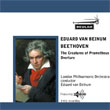 A
powerful recording – good enough to make me wish that van Beinum
had recorded the whole ballet, including the theme which Beethoven
later re-used in the Eroica Symphony. The sound is still
quite tolerable, with just a trace of distortion in the loudest
passages – effectively brushed up by Beulah for an enjoyable
release. I’m particularly pleased to see Beulah making van Beinum’s
recordings available – his (mostly Decca) recordings were my
own introduction to much of the classical repertoire. Try his
1951 Symphonie Fantastique on Beulah 1PD30, with
other Berlioz Interpretations (£7.99 from iTunes),
or on its own on Naxos Classical Archive for £1.99, from classicsonline.
A
powerful recording – good enough to make me wish that van Beinum
had recorded the whole ballet, including the theme which Beethoven
later re-used in the Eroica Symphony. The sound is still
quite tolerable, with just a trace of distortion in the loudest
passages – effectively brushed up by Beulah for an enjoyable
release. I’m particularly pleased to see Beulah making van Beinum’s
recordings available – his (mostly Decca) recordings were my
own introduction to much of the classical repertoire. Try his
1951 Symphonie Fantastique on Beulah 1PD30, with
other Berlioz Interpretations (£7.99 from iTunes),
or on its own on Naxos Classical Archive for £1.99, from classicsonline.
Franz SCHUBERT Symphony
No.4 in c minor (Tragic)
Concertgebouw Orchestra/Eduard van Beinum – rec.1952. Mono/ADD
BEULAH EXTRA 2BX37, 3BX37, 4BX37 [28:28] – from Beulah
(mp3)
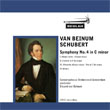 The
1953 Gramophone reviewer thought this one of Schubert’s
least successful symphonies because of the influence of Beethoven;
even now, the ‘Tragic’ is not often performed. Van Beinum’s
version came out in competition with Klemperer and the Lamoureux
Orchestra on Vox, which the present recording easily won, despite
the fact that the latter was complete on one side, whilst Decca
spread the van Beinum over two and charged 36/5, the equivalent
of around £50 today. Van Beinum clearly had a natural affinity
with this work – by no means the duffer that it’s often made
out to be – and the recording clearly now sounds (much) better
than on that early LP, which was dubbed ‘backward’. I very much
enjoyed hearing this.
The
1953 Gramophone reviewer thought this one of Schubert’s
least successful symphonies because of the influence of Beethoven;
even now, the ‘Tragic’ is not often performed. Van Beinum’s
version came out in competition with Klemperer and the Lamoureux
Orchestra on Vox, which the present recording easily won, despite
the fact that the latter was complete on one side, whilst Decca
spread the van Beinum over two and charged 36/5, the equivalent
of around £50 today. Van Beinum clearly had a natural affinity
with this work – by no means the duffer that it’s often made
out to be – and the recording clearly now sounds (much) better
than on that early LP, which was dubbed ‘backward’. I very much
enjoyed hearing this.
Franz LISZT (1811-1886) Les
Préludes
Paris Conservatoire Orchestra/Enrique Jorda – rec.1947. Mono/ADD
BEULAH EXTRA 3BX57 [15:17] – from Beulah
(mp3)
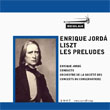 The
Gramophone reviewer in 1948 thought the music ‘old stuff’
but believed that this recording would be very hard to beat.
With Liszt’s bicentenary almost upon us, I suppose that we shall
have plenty of new recordings and reissues of Les Préludes
that easily outshine this in terms of playing and recording.
Of all the Beulah Extras this month, this seems to me of least
interest, except as a historical document – there’s even a touch
of surface noise in places. One interesting historical comparison:
the 78 recording cost 35/8, the equivalent of at least £50 now.
Some things do get better.
The
Gramophone reviewer in 1948 thought the music ‘old stuff’
but believed that this recording would be very hard to beat.
With Liszt’s bicentenary almost upon us, I suppose that we shall
have plenty of new recordings and reissues of Les Préludes
that easily outshine this in terms of playing and recording.
Of all the Beulah Extras this month, this seems to me of least
interest, except as a historical document – there’s even a touch
of surface noise in places. One interesting historical comparison:
the 78 recording cost 35/8, the equivalent of at least £50 now.
Some things do get better.
Richard WAGNER (1813-1883)
The Flying Dutchman Overture
Berlin Philharmonic/Richard Strauss – rec.1931. Mono/ADD
BEULAH EXTRA 2BX40 [9:24] – from Beulah
(mp3)
A historical curiosity – Strauss conducting Wagner, whom he
admired. The thin recording doesn’t help, though it has been
wonderfully tidied up. The CHARM project (see below) offers
a 1952 recording – yes, they were still making 78s then – with
Nikolai Malko conducting the Philharmonia Orchestra on HMV C4176
– here
– which you may find more to your liking, apart from the fact
that no attempt has been made to join the sides, as Beulah do.
Josef Joachim RAFF (1822-1882)
Cavatina, Op.85/3
London Symphony Orchestra/Sir Malcolm Sargent – rec.1930. Mono/ADD
BEULAH EXTRA 8BX13 [4:32] – from Beulah
(mp3)
There are not many modern recordings of this piece, and only
one on a CD devoted entirely to the music of Raff (Tudor 7086
– see review).
The recording is rather faded, but this is otherwise a pleasant
trip down Memory Lane.
Sir Edward ELGAR (1857-1934)
Chanson de Matin; Chanson de Nuit [7:35]
Three Bavarian Dances [12:02]
London Philharmonic Orchestra/Sir Adrian Boult – rec.1954. Mono/ADD
BEULAH EXTRA 15bx12 (Chansons), 16BX12
(Dances) – from Beulah
(mp3)
Gustav HOLST (1874-1934) The
Perfect Fool [10:46]
London Philharmonic Orchestra/Sir Adrian Boult – rec.1954. Mono/ADD
BEULAH EXTRA 17BX12 – from Beulah
(mp3)
George BUTTERWORTH (1885-1916)
The Banks of Green Willow [5:19]; A Shropshire
Lad [8:40]
London Philharmonic Orchestra/Sir Adrian Boult – rec.1954. Mono/ADD
BEULAH EXTRA 18bx12 (Willow), 19BX12 (Shropshire)
[13:59] – from Beulah
(mp3)
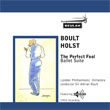 More
early fruits of the Indian Summer which lasted many years after
Boult’s enforced retirement from the BBC, to add to the Beulah
album of English Music which I made my Reissue of the Month
last month. The performances are self-recommending and the
1954 recording has come up well in these transfers.
More
early fruits of the Indian Summer which lasted many years after
Boult’s enforced retirement from the BBC, to add to the Beulah
album of English Music which I made my Reissue of the Month
last month. The performances are self-recommending and the
1954 recording has come up well in these transfers.
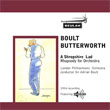 The
recordings of the Elgar Chansons have appeared in a 5-CD
set on the LPO label but are none the less welcome separately.
There are many other highly recommendable versions of all this
music – I’m thinking especially of the Chandos recording of
The Perfect Fool which I recommended in February
2009, one of the last of Richard Hickox’s recordings,
CHSA5069. (See also review by MWI Classical Editor here.)
There’s also a wonderful anthology of later performances on
Lyrita, Boult Conducts Holst (SRCD.222, not including
The Perfect Fool so no overlap – see review),
but none which excels Boult’s sure touch in 1954. Everything
here is well worth the modest asking price.
The
recordings of the Elgar Chansons have appeared in a 5-CD
set on the LPO label but are none the less welcome separately.
There are many other highly recommendable versions of all this
music – I’m thinking especially of the Chandos recording of
The Perfect Fool which I recommended in February
2009, one of the last of Richard Hickox’s recordings,
CHSA5069. (See also review by MWI Classical Editor here.)
There’s also a wonderful anthology of later performances on
Lyrita, Boult Conducts Holst (SRCD.222, not including
The Perfect Fool so no overlap – see review),
but none which excels Boult’s sure touch in 1954. Everything
here is well worth the modest asking price.
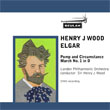 Sir
Edward ELGAR Pomp and Circumstance March No.1 in
D
Sir
Edward ELGAR Pomp and Circumstance March No.1 in
D
London Philharmonic Orchestra/Sir Henry Wood – rec 1940. Mono/ADD
BEULAH EXTRA 5BX3 [4:22] – from Beulah
(mp3)
A valuable souvenir of a rather measured wartime recording,
though not, I think, likely to be anyone’s first or only choice
for this work. Go for Beulah’s Boult recordings of Elgar first.
Alphons DIEPENBROCK (1862-1961)
Marsyas – incidental music
Concertgebouw Orchestra/Eduard van Beinum – rec.1953. Mono/ADD
BEULAH EXTRA 1BX37 [16:43] – from Beulah
(mp3)
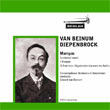 The
story may be gruesome – Marsyas was flayed because his music
challenged that of Apollo. However Diepenbrock’s incidental
music – reminiscent of L’après-midi d’un faune
– is certainly well worth hearing in this idiomatic performance.
The recording is much more than tolerable in this transfer.
With just two modern recordings – from Chandos and Brilliant
Classics, both 2-CD sets – Marsyas deserves the advocacy
of van Beinum.
The
story may be gruesome – Marsyas was flayed because his music
challenged that of Apollo. However Diepenbrock’s incidental
music – reminiscent of L’après-midi d’un faune
– is certainly well worth hearing in this idiomatic performance.
The recording is much more than tolerable in this transfer.
With just two modern recordings – from Chandos and Brilliant
Classics, both 2-CD sets – Marsyas deserves the advocacy
of van Beinum.
Samuel COLERIDGE-TAYLOR (1875-1912)
Petite Suite de Concert
London Symphony Orchestra/Sir Malcolm Sargent – rec. 1931. Mono/ADD
BEULAH EXTRA 9BX13 [14:02] – from Beulah
(mp3)
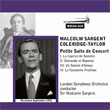 The
recording is inevitably faded, but not so much as to negate
the pleasure of hearing Sargent’s idiomatic performance of a
composer who is still too little known, despite the advocacy
of the likes of Hyperion and Avie, both of whom have fine performances
of his Violin Concerto. Much of the music will seem familiar,
nevertheless. Very little surface noise remains in this fine
transfer.
The
recording is inevitably faded, but not so much as to negate
the pleasure of hearing Sargent’s idiomatic performance of a
composer who is still too little known, despite the advocacy
of the likes of Hyperion and Avie, both of whom have fine performances
of his Violin Concerto. Much of the music will seem familiar,
nevertheless. Very little surface noise remains in this fine
transfer.
Ballet by Arrangement
Johann Sebastian BACH (1685-1750),
arr. William WALTON The
Wise Virgins [20:44]
London Philharmonic Orchestra/Sir Adrian Boult – rec. 1954.
Mono/ADD.
William BOYCE (1711-1779)
arr. Constant LAMBERT The
Prospect before Us [24:22]
Sadlers Wells Orchestra/Constant Lambert – rec. 1940. Mono/ADD
Domenico SCARLATTI (1685-1757)
arr. Vincenzo TOMMASINI
The Good Humoured Ladies (1916/17) [14:55]
Paris Conservatoire Orchestra/Roger Désormière
– rec. 1950. Mono/ADD
Luigi BOCCHERINI (1743-1805)
arr. Jean FRANÇAIX
Scuola di Ballo [17:01]
London Philharmonic Orchestra/Antal Doráti – rec. 1939.
Mono/ADD
BEULAH 1PD40 [78:17] – due shortly from iTunes: please
check here.
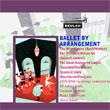 These
works have in common baroque music arranged by 20th-century
composers – just the sort of thing for which I have a weak spot
– in recordings ranging from 1939 to 1954.
These
works have in common baroque music arranged by 20th-century
composers – just the sort of thing for which I have a weak spot
– in recordings ranging from 1939 to 1954.
By the time that the complete Boult recording of The Wise
Virgins appeared on a 10” LP in 1955, Sheep may safely
graze had appeared twice on EP – most primary schools owned
a copy to play as a prelude to morning assembly. So enduring
was this association that it was a long time before I discovered
that the original is taken from a secular, not a church cantata,
and that the good shepherd was the local ruler. The Gramophone
reviewer praised the performance, which remains a model of how
to do this sort of thing, equalled only by Bryden Thomson on
Chandos – but he thought the recording not one of Decca’s better
efforts, which means that Beulah have done a fine job in making
it sound more than acceptable.
The Boyce/Lambert The Prospect Before Us was completely
unknown to me; it has some claim to be the pick of these recordings.
Constant Lambert made a number of recordings of ballet music
for HMV in 1939/40, several of which, including the Boyce arrangement,
have been released by Somm on SOMMCD080. That Somm release is
a very attractive prospect, with excellent transfers – see review
by Bob Briggs – but the same is true of the current Beulah offering,
in thin but very acceptable sound.
I have already commented on the Scarlatti and Boccherini arrangements
as Beulah Extra downloads, so I’ll content myself with repeating
what I wrote last month.
Good Humoured Ladies (also available
as a download, 1BX17): I really enjoy this kind of confection
and I was very pleased to be reminded of this suite from Le
Donne di buon Umore, which began life as a skilful arrangement
of sonatas by Domenico Scarlatti for a Diaghilev ballet. The
performance has the kind of panache that is needed in order
to bring off the blend of old and new and the recording is still
quite acceptable, if a little thin. A friend recently remarked
that about 1954 was a sort of watershed for sound that doesn’t
remind the listener too much of its age. This is noticeably
a little earlier than that watershed, but it’s well worth the
modest asking price. In any case, the only rivals in the current
catalogue appear to be a Testament CD transfer of the same Désormière
performance, coupled with Ibert’s Divertissement, etc.
(SBT1309) and another Testament CD with the Philharmonia and
Igor Markevich (SBT1105).
Scuola di Ballo (also available as a download,
1BX14): Ten pieces by Boccherini, arranged for a ballet
by Jean Françaix in or before 1933 and performed by the
Ballet Russe de Monte-Carlo under the direction of Dorati, who
recorded the music in 1939. I’m normally a great fan of this
kind of pastiche, but I must admit to being underwhelmed by
the present concoction, though it’s all well played and the
transfer is very good for its age. The 1998 Pearl CD including
the same performance seems to have disappeared from the catalogue.
I was about to write that there was no current version of this
music until I discovered that there is a Hyperion recording,
coupled with other works by Françaix (CDA67323 – see
review).
King’s College, London, CHARM Project
King’s College, London, have made available online free
of charge the digitised versions of their collection of 78s
and a few early LPs. The Homepage is here:
click on ‘Sound Files Search’ at the right of the page to be
taken to a list of composers in alphabetical order, performers
and dates. The transfers are all in lossless flac.
I haven’t had much time yet to explore, but can report on some
stylish performances of Abel (mis-spelled as ‘Able’)
and Handel from the Boyd Neel Chamber Orchestra in 1940,
performances which show more period awareness than I had thought
possible for the date, Albert Sammons and Kathleen Long performing
Delius’ Third Violin Sonata in 1944 and, best of all,
Barbirolli with the LSO in 1947 in Elgar – the Enigma
Variations and Introduction and Allegro. The records
all seem to be in excellent condition; though they are played
simply as they are, with no attempt to connect up the sides,
I very much enjoyed the Elgar in particular.
You’ll also find a 1939 Boyd Neel Orchestra recording of Herbert
Howells’ Elegy for Viola, String Quartet and String Orchestra,
a work not performed all that often – of modern recordings I
know only of versions by Boult (Lyrita SRCD.245 – see review)
and Hickox (Chandos CHAN9161).
***
The Play of Daniel – a 12th Century Musical
Drama
Processional [3:52]; Jubilemus Regi nostro [4:19]; Vos
Danielem quaerite [4:00]; Solvitur in libro Salomonis
[6:35]; Ecce Rex Darius [5:11]; Rex, in eternum
vive! [1:30]; Heu, heu, heu! [4:35]; Te Deum Laudamus
[10:29]
New York Pro Musica/Noah Greenberg – rec. New York, 1958. Stereo/ADD
Latin text and translation available to download
HIGH DEFINITION TAPE TRANSFERS HDCD199 [40:31] - from
HDTT
(CD, DVD, 24-bit/96kHz or 24/192 flac download)
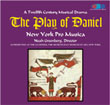 This
recording, first issued on the Brunswick label, a US Decca subsidiary,
brought the 12th/13th-century liturgical
Play of Daniel, performed at Beauvais, to general attention.
It represents an important landmark in the history of drama
and of music and this recording now itself has historical status.
The work has been performed and recorded several times since,
in particular, slightly less colourfully, by Pro Cantione Antiqua
and the Landini Consort, directed by Mark Brown (last seen on
Decca Serenata 433 371-2) and by the Dufay Collective on Harmonia
Mundi HMU90 7479. I haven’t heard the Dufay Collective version,
but the PCA deserves to be reissued, adding, as it does, to
the text of the play as performed by Greenberg a work attributed
to Albertus Parisiensis at the opening, one by Pérotin
in the middle, and a couple of contemporary instrumental pieces.
This
recording, first issued on the Brunswick label, a US Decca subsidiary,
brought the 12th/13th-century liturgical
Play of Daniel, performed at Beauvais, to general attention.
It represents an important landmark in the history of drama
and of music and this recording now itself has historical status.
The work has been performed and recorded several times since,
in particular, slightly less colourfully, by Pro Cantione Antiqua
and the Landini Consort, directed by Mark Brown (last seen on
Decca Serenata 433 371-2) and by the Dufay Collective on Harmonia
Mundi HMU90 7479. I haven’t heard the Dufay Collective version,
but the PCA deserves to be reissued, adding, as it does, to
the text of the play as performed by Greenberg a work attributed
to Albertus Parisiensis at the opening, one by Pérotin
in the middle, and a couple of contemporary instrumental pieces.
Nevertheless, the Greenberg has pride of place – I remember
a fellow undergraduate at Oxford telling me what a discovery
it was, almost 50 years ago – and I am very pleased to encounter
it again in such a fine transcription. There is a very slight
dropout between tracks 1 and 2, as played via Squeezebox, but
that appears to be caused by Squeezebox, since Winamp joins
the two tracks seamlessly – you may prefer to download the free
version of Winamp if you haven’t already got it. Otherwise,
once again I am amazed at the quality of sound which HDTT is
able to obtain from commercial reel-to-reel tapes – and with
such little analogue hiss. This is a strong runner-up to the
Beulah Schubert as Reissue of the Month.
Music from Magdalen
ANONYMOUS Magnificat
antiphon - Inclita sancte [1:11]
John SHEPPARD (c.1515-1559/60)
Magnificat a4 [9:36]; O happy dames [2:03]
John MASON (fl.1520s) Vae
nobis miseris [11:44]
John SHEPPARD Laudem
dicite Deo [7:40]
Richard DAVY (c.1465-1507)
Joan is sick and ill at ease [5:37]
John SHEPPARD In manus
tuas I-III [10:37]; Spiritus sanctus procedens a5
[7:57]
ANONYMOUS Magnificat
antiphon - In diebus illis [1:52]
Richard DAVY Ah myn hart,
remembir thee well a3 [5:08]
John MASON Quales sumus,
antiphon a5 [10:55]
The Magdalen Collection/Harry Christophers – rec. 1997. DDD.
CORO COR16049 [74:20] – from passionato
(mp3 and lossless)
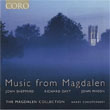 This
recording was originally issued in 1997 on the Collins Classics
label as a tribute to the late Bernard Rose, former informator
choristorum at Magdalen College, Oxford. Harry Christophers,
himself a Magdalen alumnus, conducted an ad hoc group in a programme
of music by three of Rose’s Tudor predecessors as informator,
in editions produced by Rose himself. The result is a very successful
anthology which should lead the uninitiated to other recordings
of this repertoire, notable by The Sixteen (with Harry Christophers
on Coro again) and The Tallis Scholars (on Gimell).
This
recording was originally issued in 1997 on the Collins Classics
label as a tribute to the late Bernard Rose, former informator
choristorum at Magdalen College, Oxford. Harry Christophers,
himself a Magdalen alumnus, conducted an ad hoc group in a programme
of music by three of Rose’s Tudor predecessors as informator,
in editions produced by Rose himself. The result is a very successful
anthology which should lead the uninitiated to other recordings
of this repertoire, notable by The Sixteen (with Harry Christophers
on Coro again) and The Tallis Scholars (on Gimell).
One such follow-up album might well be Songs of Angels,
Signum Classics SIGCD038 [73:01], another Magdalen recording,
this time with the choir directed by Bill Ives in music by Sheppard,
Davy and Mason again, plus Jacquet of Mantua and Thomas Preston.
There is just one overlapping item, the Mason setting of Quales
sumus, taken at a slightly slower pace than by Christophers.
Download in mp3 from classicsonline.
What purports to be the same recording from passionato is actually
part of a completely different recording – A Songbook for
Isabella.
Giovanni Pierluigi da PALESTRINA
(c.1525-1594) Missa Papae Marcelli
Viri Galilæi (Introit) [1:27]; Omnes gentes
(Psalm) [4:56]; Kyrie [3:49]; Gloria [6:01]; Alleluia
ascendit Deus [2:07]; Jesu nostra redemptio (Ascension
hymn) [6:11]; Credo [8:50];
Beati omnes (Motet) [4:17]; Ascendit Deus (Offertory)
[1:48]; Viri Galilaei - Ascendit Deus (Motet) [6:05];
Sanctus [3:38]; Benedictus [2:39]; Caro mea
(Motet) [3:13];
Coenantibus illis (Motet) [3:35]; Agnus Dei [5:13]
Ensemble Officium/Wilfried Rombach
rec. Ev. Kirche Peter & Paul, Mössingen, 23-25 August
2004. DDD/DSD
CHRISTOPHORUS CHR77313 [64:55] – from passionato (mp3
and lossless)
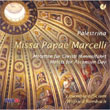 This
is not the first time that we have had a Palestrina Mass coupled
with the propers for the Ascension: the Elmer Iseler Singers
have performed the Missa Ascendo ad Patrem with the Ascension
Introit, Offertory and Communion on a CD entitled The Glory
of Palestrina (CBC Classics MVCD1067). Their choice of a
Mass based on an Ascensiontide chant is more appropriate than
Officium’s employment of the Marcellus Mass. More appropriate
still might have been a recording of Palestrina’s Missa Viri
Galilæi, based on his setting of that Ascensiontide
piece, but I suppose Christophorus thought that the more familiar
work would help sell their recording. In any case, Hyperion
have just reissued their first-rate Westminster Cathedral recording
of the Missa Viri Galilæi (CDH55355 – see June
Download
Roundup).
This
is not the first time that we have had a Palestrina Mass coupled
with the propers for the Ascension: the Elmer Iseler Singers
have performed the Missa Ascendo ad Patrem with the Ascension
Introit, Offertory and Communion on a CD entitled The Glory
of Palestrina (CBC Classics MVCD1067). Their choice of a
Mass based on an Ascensiontide chant is more appropriate than
Officium’s employment of the Marcellus Mass. More appropriate
still might have been a recording of Palestrina’s Missa Viri
Galilæi, based on his setting of that Ascensiontide
piece, but I suppose Christophorus thought that the more familiar
work would help sell their recording. In any case, Hyperion
have just reissued their first-rate Westminster Cathedral recording
of the Missa Viri Galilæi (CDH55355 – see June
Download
Roundup).
Otherwise I agree with Gavin Dixon’s recommendation in his review:
“When it comes to Papae Marcelli recordings, the field
is already crowded, but even so this disc deserves recommendation.
If you like boy’s voices on the top lines, driving tempi or
halo-like cathedral acoustics, give this one a miss. On the
other hand, if you like clarity, engagement, precision and top-notch
audio, this could be the Papae Marcelli for you.”
Love and Lament
Claudio MONTEVERDI (1567-1643)
Lamento della Ninfa (1638) [6:05]
Girolamo FRESCOBALDI (1583-1643)
Toccata 2a in F [3:55]
Domenico MAZZOCCHI (1592-1665)
Lamento di David [10:54]
Johann KAPSBERGER (c.1580-1651)
Toccata Settima (1640) [5:40]
Alessandro della CIAIA (c.1605-c.1670)
Lamentatio Virginis in dispositione Filii de cruce (1666)
[17:15]
Michelangelo ROSSI (c.1601/2-1656)
Settima Toccata [5:14]
Giacomo CARISSIMI (1607-1754)
Historia di Jephte [24:12]
Johannette Zomer (soprano); Capella Figuralis; Netherlands Bach
Society/Jos van Veldhoven – rec. 2000? DDD.
CHANNEL CLASSICS CCSSA17002 [73:00] from emusic
(mp3)
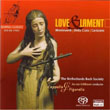 The
first and last items, the Monteverdi and the Carissimi, are
the best known and they form the principal reason for recommending
this recording, with the Historia di Jephte, an example
of early oratorio, having some claim to be considered the definitive
performance of that work. The other items, vocal and instrumental,
make excellent couplings and the whole programme is well worth
having for the cost of seven tracks, potentially less than £2.
The bit-rate ranges from a barely acceptable 192k to the maximum
320k, with most tracks at an acceptable 224k.
The
first and last items, the Monteverdi and the Carissimi, are
the best known and they form the principal reason for recommending
this recording, with the Historia di Jephte, an example
of early oratorio, having some claim to be considered the definitive
performance of that work. The other items, vocal and instrumental,
make excellent couplings and the whole programme is well worth
having for the cost of seven tracks, potentially less than £2.
The bit-rate ranges from a barely acceptable 192k to the maximum
320k, with most tracks at an acceptable 224k.
Antonio VIVALDI (1678-1741)
L’Olimpiade, RV 125 (1734)
Sara Mingardo (contralto) – Licida; Roberta Invernizzi (soprano)
– Megacle; Sonia Prina (alto) – Aristea; Marianna Kulikova (mezzo)
– Argene; Laura Giordano (soprano) – Aminta; Riccardo Novaro
(baritone) – Clistene; Sergio Foresti (bass) – Alcandro
Concerto Italiano/Rinaldo Alessandrini
rec. July 2002, Sala Accademica del Pontificio, Istituto di
Musica Sacra, Rome. DDD.
NAÏVE OPUS 111 30316 [3 CDs 174:56] - from classicsonline
(mp3) (highlights on NAÏVE OP30451)
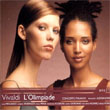 See
Glyn Pursglove’s review of the highlights CD: “I can think of
only one possible reason why any lover of Vivaldi or baroque
opera would not wish to possess this CD of highlights from L’Olimpiade:
because he or she already owns the complete recording from which
they are taken.” If you didn’t follow GP’s advice to buy the
highlights disc, the whole opera can be yours as a download
for £23.97 in good mp3 sound.
See
Glyn Pursglove’s review of the highlights CD: “I can think of
only one possible reason why any lover of Vivaldi or baroque
opera would not wish to possess this CD of highlights from L’Olimpiade:
because he or she already owns the complete recording from which
they are taken.” If you didn’t follow GP’s advice to buy the
highlights disc, the whole opera can be yours as a download
for £23.97 in good mp3 sound.
Handel ‘Oxford’ Water Music
George Frideric HANDEL (1685-1759)
Trio Sonata in G, Op.5/4, HWV399 (1734) [13:16]
Jean-Marie LECLAIR (1697-1764)
Première Récréation de musique in
D, Op 6 (1736) [23:48]
Arcangelo CORELLI (1653-1713)
Trio Sonata in G, Op 2/12 (1685) [3:37];
Trio Sonata in C, Op.1/7 (1681) [4:49]
Francesco GEMINIANI (1687-1762)
Violin Sonata in A minor, Op 4/5 (1742) [6:15]
George Frideric HANDEL Water
Music, Suites 1-3, HWV348-350 (1717) (arr. Tatty Theo for chamber
ensemble) [14:31]; Trio Sonata Op.2/3 in B flat, HWV388 (1730)
[11:05]
Brook Street Band (Hannah McLaughlin (oboe), Marianna Szücs,
Katalin Kertesz (violins),
Tatty Theo (cello), Carolyn Gibley (harpsichord)) – rec. 2002.
DDD.
Avie AV0028 [77:23] – from passionato
(mp3 and lossless)
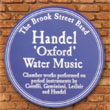 A
very attractive programme containing chamber-scale excerpts,
from early manuscript versions, of the Handel Water Music,
together with music by his contemporaries, all very well performed
and recorded. Recommended to anyone who already owns a version
of the conventional Water Music, of which there are many
fine versions, not least those of Trevor Pinnock in a multi-disc
budget box of Handel recordings, Joint Bargain of the Month
in my April 2010 Roundup,
and Hervé Niquet on Glossa (see April 2009 Roundup).
A
very attractive programme containing chamber-scale excerpts,
from early manuscript versions, of the Handel Water Music,
together with music by his contemporaries, all very well performed
and recorded. Recommended to anyone who already owns a version
of the conventional Water Music, of which there are many
fine versions, not least those of Trevor Pinnock in a multi-disc
budget box of Handel recordings, Joint Bargain of the Month
in my April 2010 Roundup,
and Hervé Niquet on Glossa (see April 2009 Roundup).
- See MusicWeb International review: Recording of the Month
– here.
Music for St Paul’s
George Frideric HANDEL (1685-1759)
Utrecht Te Deum, HWV278 (1713) [20:30]
Utrecht Jubilate, HWV279 (1713) [16:29]
John BLOW (1649-1708)
I was glad when they said unto me (1697) [14:11]
William BOYCE (1711-1779)
Lord, thou hast been our refuge (1755) [22:43]
Edward Burrowes, Timothy Burtt, Alastair Cook (trebles); Julia
Gooding, Sophie Daneman (sopranos); Robin Blaze, Ashley Stafford
(countertenors); Rogers Covey-Crump (high tenor); Mark Le Brocq
(tenor); Andrew Dale Forbes (bass); The Choir of St Paul’s Cathedral
The Parley of Instruments (Peter Holman, director)/John Scott
rec. St Paul’s, London, 13-17 October 1997. DDD. Texts included.
HYPERION HELIOS CDH55359 [74:13] – from Hyperion
(mp3 and lossless)
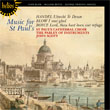 The
earliest piece here, by Blow, was written for the official consecration
of St Paul’s in 1697. The two Handel works were written to celebrate
the Duke of Marlborough’s victories and the Treaty of Utrecht
which sealed the peace pro tem, whilst the Boyce, here
receiving its first recording, was written for the Festival
of the Children of the Clergy. The Handel works, his first major
setting of English, are hardly vintage pieces and the performances
are a little scrappy in places – try the trebles at the opening
of the Te Deum to see what I mean. The Decca/Oiseau-Lyre
recording with Emma Kirkby, Judith Nelson and Simon Preston
on a Double Decca (458 0722, with the music for Alceste,
etc., or 455 0412, with the Coronation Anthems) is preferable.
Download the former from passionato.com here
– ignore the fact that the wrong cover is illustrated – and
the latter here
or buy the equivalent CDs, which are actually available less
expensively. The Blow and Boyce works are worth having.
The
earliest piece here, by Blow, was written for the official consecration
of St Paul’s in 1697. The two Handel works were written to celebrate
the Duke of Marlborough’s victories and the Treaty of Utrecht
which sealed the peace pro tem, whilst the Boyce, here
receiving its first recording, was written for the Festival
of the Children of the Clergy. The Handel works, his first major
setting of English, are hardly vintage pieces and the performances
are a little scrappy in places – try the trebles at the opening
of the Te Deum to see what I mean. The Decca/Oiseau-Lyre
recording with Emma Kirkby, Judith Nelson and Simon Preston
on a Double Decca (458 0722, with the music for Alceste,
etc., or 455 0412, with the Coronation Anthems) is preferable.
Download the former from passionato.com here
– ignore the fact that the wrong cover is illustrated – and
the latter here
or buy the equivalent CDs, which are actually available less
expensively. The Blow and Boyce works are worth having.
The recording is good, but for once the Hyperion notes are short,
though mainly to the point. They fail to point out that Rogers
Covey-Crump sings the opening section of the Jubilate
as a high tenor, rather than the alto traditionally assigned
to the part, following recent research.
Charles AVISON
(1709-1770)
Six Sonatas for the harpsichord with accompaniments for two
violins and violoncello, Op.5 [65:33]
Six Sonatas for the harpsichord with accompaniments for two
violins and violoncello, Op.7 [46:36]
Members of the Avison Ensemble: Gary Cooper (harpsichord); Pavlo
Beznosiuk and Caroline Balding (violins), Robin Michael (cello)
DIVINE ART DDA21215 [65:33 + 46:36] – from classicsonline
(mp3)
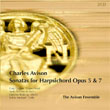 This
is a fine successor to the earlier 2-CD sets of Avison which
Divine Art have been issuing over the past couple of years.
The music, performances and recording are all as recommendable
as on those earlier recordings. Just two niggles: the Naxos
Music Library offers the back cover to its subscribers – sample
the performances there first if you wish – so why cannot their
partner site, classicsonline, do the same for purchasers? Like
the other sets, Divine Art offer the parent CDs as two-for-one;
at £9.99, though the classicsonline price is still lower than
that of the discs, it doesn’t represent the 2-for-1 discount,
since it is twice their usual (attractive) price for this label
of £4.99.
This
is a fine successor to the earlier 2-CD sets of Avison which
Divine Art have been issuing over the past couple of years.
The music, performances and recording are all as recommendable
as on those earlier recordings. Just two niggles: the Naxos
Music Library offers the back cover to its subscribers – sample
the performances there first if you wish – so why cannot their
partner site, classicsonline, do the same for purchasers? Like
the other sets, Divine Art offer the parent CDs as two-for-one;
at £9.99, though the classicsonline price is still lower than
that of the discs, it doesn’t represent the 2-for-1 discount,
since it is twice their usual (attractive) price for this label
of £4.99.
I’ve already recommended the other Avison Ensemble recordings
of the music of their namesake: Op.6 Concertos (Naxos
8.557533/4) and the Divine Art 2-CD sets DDA21210
(Concerti Grossi after Geminiani’s Op.1), 21211 (Op.9/10),
21213 (Concerti after Scarlatti) and 21214 (Trio
Sonatas and Keyboard Sonatas), all available from classicsonline.
Let me add, to complete the set, their equally fine recording
of the Op.3 and Op.4 Concertos on Naxos 8.557905/6,
available from classicsonline
(mp3).
William BOYCE
(1711-1779) Trio Sonatas Nos.1-12 (1747); Sonatas Nos.13-15
(from Fitzwilliam MS, Cambridge)
The Parley of Instruments/Peter Holman – rec. October 1995.
DDD.
HYPERION DYAD22063 [2CDs-for-1: 120:11] – from Hyperion
(mp3 and lossless)
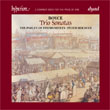 Double
helpings of Boyce’s attractive music from Hyperion this month
- see Music from St Paul's (above). If you already know
and like his Symphonies, which one Radio 3 announcer recently
revealed that his young son classified, appropriately, as ‘bouncy’,
you’ll find more of the same here – not just the twelve published
works but three additional, recently discovered sonatas to complete
a highly enjoyable pair of recordings at budget price. The recording
is excellent and the presentation – easily downloaded and printed
– well up to Hyperion standards. If, like me, you have had problems
downloading from Hyperion via freedownloadmanager, you should
try using Safari or Google Chrome, both easily obtained free
if you don’t already have them and both very effective at downloading
several tracks simultaneously. I’m told that Firefox works well,
too, with Hyperion downloads, using the downthelot add-on.
Double
helpings of Boyce’s attractive music from Hyperion this month
- see Music from St Paul's (above). If you already know
and like his Symphonies, which one Radio 3 announcer recently
revealed that his young son classified, appropriately, as ‘bouncy’,
you’ll find more of the same here – not just the twelve published
works but three additional, recently discovered sonatas to complete
a highly enjoyable pair of recordings at budget price. The recording
is excellent and the presentation – easily downloaded and printed
– well up to Hyperion standards. If, like me, you have had problems
downloading from Hyperion via freedownloadmanager, you should
try using Safari or Google Chrome, both easily obtained free
if you don’t already have them and both very effective at downloading
several tracks simultaneously. I’m told that Firefox works well,
too, with Hyperion downloads, using the downthelot add-on.
If you have yet to become acquainted with the Eight Symphonys
[sic], Op.2, passionato have four excellent versions from Trevor
Pinnock (DGG), Kevin Mallon (Naxos, also available from classiconline),
Ronald Thomas (CRD) and Christopher Hogwood (Decca), all on
period instruments except the CRD. The Naxos is the least expensive
but by no means the least recommendable. The Naxos music library
offers subscribers the Mallon and also Boughton (Nimbus NI5345
- see review)
and a Vox recording featuring Jörg Faerber and the Würtemberg
CO – remember their Turnabout LPs of the Brandenburgs
and Four Seasons, the latter with Suzanne Lautenbacher?
You’ll find the Vivaldi on Naxos Music Library, and on classicsonline
here
for a bargain £4.99; it’s a trifle heavy by the standards of
modern recordings, but well worth considering. The Boyce is
available from classicsonline, also at £4.99, here,
complete with original cover, a snazzy design from the Decca
art department.
Domenico CIMAROSA (1749–1801)
Requiem in g minor (1787)
Adriana Kučerová
(Soprano); Terézia Kružliaková
(Alto); L’udovit Ludha (Tenor); Gustáv Beláček
(Bass); Lúčnica
Chorus/Elena Matušová; Marianna Gazdíková
(Organ); Capella Istropolitana/Kirk Trevor
rec. Slovak Radio Concert Hall, Bratislava, Slovakia, 24- 25,
30 May, 1 June 2008. DDD
Booklet with texts and translations included as pdf.
NAXOS 8.572371 [51:45] – from classicsonline
(mp3)
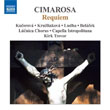 Don’t
expect the high drama of the Verdi or Mozart Requiem
– this work by Cimarosa is aptly described on the rear cover
as characterised by classical restraint. It is, nevertheless,
well worth getting to know and the performance here is thoroughly
competent, with Naxos returning to the Capella Istropolitana
who made so many fine recordings for them in their early days.
With good recording and informative notes – texts and translations
included in the pdf booklet, too – only the rather short playing
time detracts from the attractiveness of the download.
Don’t
expect the high drama of the Verdi or Mozart Requiem
– this work by Cimarosa is aptly described on the rear cover
as characterised by classical restraint. It is, nevertheless,
well worth getting to know and the performance here is thoroughly
competent, with Naxos returning to the Capella Istropolitana
who made so many fine recordings for them in their early days.
With good recording and informative notes – texts and translations
included in the pdf booklet, too – only the rather short playing
time detracts from the attractiveness of the download.
Antonio SALIERI (1750-1825)
Requiem in c minor (1804)[38:58]
Ludwig van BEETHOVEN (1770-1827)
Meeresstille und glückliche Fahrt, Op.112 [7:29]
Franz SCHUBERT (1797-1828)
Offertorium: Intende voci, D963 [9:30]
Gulbenkian Foundation Chorus and Orchestra/Lawrence Foster –
rec. November 2009. DSD.
PENTATONE PTC5186359 [56:22] - from passionato
(mp3 and lossless)
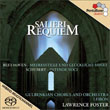 This
is not the Requiem that the film Amadeus would
have you believe that Salieri tried to steal from Mozart, but
his own composition, played at his state funeral. It’s no rival
for the Mozart, but a competent and enjoyable work. I have no
benchmark for the performances but they seem just as competent
and enjoyable as the music, and the recording does them justice,
especially in the lossless flac transfer. The fillers by his
student Beethoven, who claimed that Salieri had taught him more
than Haydn, and Schubert are pleasant makeweights, but I would
have much preferred more Salieri – and a longer playing time.
Surround-sound enthusiasts will need to buy the physical SACD.
This
is not the Requiem that the film Amadeus would
have you believe that Salieri tried to steal from Mozart, but
his own composition, played at his state funeral. It’s no rival
for the Mozart, but a competent and enjoyable work. I have no
benchmark for the performances but they seem just as competent
and enjoyable as the music, and the recording does them justice,
especially in the lossless flac transfer. The fillers by his
student Beethoven, who claimed that Salieri had taught him more
than Haydn, and Schubert are pleasant makeweights, but I would
have much preferred more Salieri – and a longer playing time.
Surround-sound enthusiasts will need to buy the physical SACD.
Wolfgang Amadeus MOZART (1756-1791)
Mozart in Vienna
Piano Sonata no.18 in D, K.576 [15:08]; Fantasy in d minor,
K.397 [5:38]; Piano Sonata no.17 in B-flat, K.570 [17:56]; Rondo
in a minor, K.511 [9:31]; Ten Variations in G major, K.455:
Unser dummer Pöbel meint [12:56]
Gottlieb Wallisch (piano)
LINN RECORDS CKD352 [61:53] – from Linn
(mp3, lossless and 24-bit Studio Master)
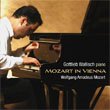 Delicacy
of touch is the hallmark and chief selling point of these recordings;
if that is your main criterion, this programme of piano music
from the last ten years of Mozart’s life may be confidently
recommended. Wallisch, who has previously recorded Schubert
for Naxos, is equally well attuned to the music of Mozart. Add
to that a good recording – even in ‘ordinary’ CD-quality sound
– and you have the ingredients of a fine download. Or would
have, if there were not so many other highly recommendable recordings
of this repertoire, though none with exactly this programme.
Some of the rivals offer better value: Haefliger (Avie AV0025
– see review)
fits the last four sonatas on one CD – available from classicsonline.
They also have Jenö Jandó’s more than workmanlike versions
of Nos. 9, 12, 16 and 17 on 8.550446
and Nos. 3, 7, 11 and 18 on 8.550448.
(Listen to all of these on the Naxos Music Library.) If tempted
by the 24-bit versions, make sure that your player can cope
with 88.2kHz or 192kHz files: Squeezebox won’t, though it does
cope with HDTT’s 96kHz flac.
Delicacy
of touch is the hallmark and chief selling point of these recordings;
if that is your main criterion, this programme of piano music
from the last ten years of Mozart’s life may be confidently
recommended. Wallisch, who has previously recorded Schubert
for Naxos, is equally well attuned to the music of Mozart. Add
to that a good recording – even in ‘ordinary’ CD-quality sound
– and you have the ingredients of a fine download. Or would
have, if there were not so many other highly recommendable recordings
of this repertoire, though none with exactly this programme.
Some of the rivals offer better value: Haefliger (Avie AV0025
– see review)
fits the last four sonatas on one CD – available from classicsonline.
They also have Jenö Jandó’s more than workmanlike versions
of Nos. 9, 12, 16 and 17 on 8.550446
and Nos. 3, 7, 11 and 18 on 8.550448.
(Listen to all of these on the Naxos Music Library.) If tempted
by the 24-bit versions, make sure that your player can cope
with 88.2kHz or 192kHz files: Squeezebox won’t, though it does
cope with HDTT’s 96kHz flac.
Die Zauberflöte, K620 (The Magic
Flute)
Erika Miklósa (soprano) - Queen of Night; Dorothea Röschmann
(soprano) - Pamina; Julia Kleiter (soprano) - Papagena; Christoph
Strehl (tenor) - Tamino; Kurt Azesberger (tenor) - Monostatos;
Hanno Müller-Brachmann (baritone) - Papageno; René
Pape (bass) - Sarastro; Caroline Stein (soprano) - First Lady;
Heidi Zehnder (soprano) - Second Lady; Anne-Carolyn Schlüter
(mezzo) - Third Lady; Alexander Lischke (soprano) - First Boy;
Frederic Jost (soprano) - Second Boy; Niklas Mallmann (mezzo)
- Third Boy; Danilo Formaggia (tenor) - First Armed Man and
Second Priest; George Zeppenfeld (bass) - Speaker; Sascha Borris
(bass) - Second Armed Man; Andreas Bauer (bass) - First Priest;
Tobias Beyer (speaker) - Third Priest
Arnold Schoenberg Choir; Mahler Chamber Orchestra/Claudio Abbado
rec. Teatro Comunale, Modena, Italy, September 2005. DDD.
DEUTSCHE GRAMMOPHON 477 5789 [2 CDs: 148:38] – from
passionato
(mp3)
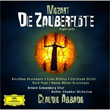 The
classic Klemperer recording – without dialogue, and all the
better for that, in my opinion – remains an unshakeable first
choice for me, but this is an excellent modern alternative.
As Dan Morgan wrote of the highlights CD: “Abbado and the Mahler
Chamber Orchestra have learned something from the authenticists
and strike a good balance between the stylistic extremes of
Harnoncourt and Klemperer. As I have indicated there is much
to savour in between but if you want a thoroughly refreshing
Zauberflöte, well played and well sung, the Abbado
is hard to beat.” (477 6319 - see review.)
The
classic Klemperer recording – without dialogue, and all the
better for that, in my opinion – remains an unshakeable first
choice for me, but this is an excellent modern alternative.
As Dan Morgan wrote of the highlights CD: “Abbado and the Mahler
Chamber Orchestra have learned something from the authenticists
and strike a good balance between the stylistic extremes of
Harnoncourt and Klemperer. As I have indicated there is much
to savour in between but if you want a thoroughly refreshing
Zauberflöte, well played and well sung, the Abbado
is hard to beat.” (477 6319 - see review.)
Hector BERLIOZ (1803-1869)
Symphonie Fantastique, Op.14 [49:01]
Boston Symphony Orchestra/Charles Munch – rec.1962. Stereo/ADD
HIGH DEFINITION TAPE TRANSFERS HDCD207 [49:01] – from
HDTT
(24 bit/96kHz or 192kHz)
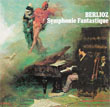 Munch's
earlier, 1954, recording is also available as a hybrid SACD
on the mid-price RCA Living Stereo label, coupled with an excerpt
from Romeo and Juliet (82876678992 – see appreciative
reviews by Jonathan Woolf of this recording in a box set - here
– and by Christopher Howell - here).
I haven’t heard that CD, but the HDTT transfer, taken from a
4-track commercial tape, sounds very well, especially when the
original LP issue was not exactly singled out by reviewers for
its sound quality. The performance is good, often very good,
with the Boston players clearly superior to their Lamoureux
counterparts on the Roussel recording (below), but competition
is fierce in this symphony, with Beecham’s EMI recording still
top of a very distinguished tree among recordings of this vintage.
Beecham also comes with a coupling, whereas the Munch is short
value at $12 (96kHz) or $16 (192kHz). HDTT also have a recording
of the Symphonie Fantastique by André Vandernoot
with the French National Orchestra, which I plan to review in
next month’s Roundup – see review
by Bob Briggs.
Munch's
earlier, 1954, recording is also available as a hybrid SACD
on the mid-price RCA Living Stereo label, coupled with an excerpt
from Romeo and Juliet (82876678992 – see appreciative
reviews by Jonathan Woolf of this recording in a box set - here
– and by Christopher Howell - here).
I haven’t heard that CD, but the HDTT transfer, taken from a
4-track commercial tape, sounds very well, especially when the
original LP issue was not exactly singled out by reviewers for
its sound quality. The performance is good, often very good,
with the Boston players clearly superior to their Lamoureux
counterparts on the Roussel recording (below), but competition
is fierce in this symphony, with Beecham’s EMI recording still
top of a very distinguished tree among recordings of this vintage.
Beecham also comes with a coupling, whereas the Munch is short
value at $12 (96kHz) or $16 (192kHz). HDTT also have a recording
of the Symphonie Fantastique by André Vandernoot
with the French National Orchestra, which I plan to review in
next month’s Roundup – see review
by Bob Briggs.
Felix MENDELSSOHN (1809-1847)
Piano Trios: No. 1 in D minor, Op. 49 (1839) [26:51]; No. 2
in C minor, Op. 66 (1845) [26:54].
The Florestan Trio (Anthony Marwood (violin); Richard Lester
(cello); Susan Tomes (piano)).
rec. Henry Wood Hall, London, 16-18 December 2003. DDD
HYPERION CDA67485 [53:45] - from Hyperion
(mp3 or lossless)
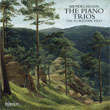 Reviewing
a recent release of these trios from Itzhak Perlman, Emanuel
Ax and Yo-Yo Ma (Sony Classical 88697 52192 2), I turned for
comparison to these award-winning Florestan Trio versions and
found them to be preferable – the superb winning over the (very)
good, without resorting to any gimmicks, just staying faithful
to Mendelssohn’s markings. Colin Clarke thought these the first
choice, too – see his review.
There’s a real bonus for downloaders, too, in that the short
playing time is reflected in the price: just £5.99 for mp3 or
lossless.
Reviewing
a recent release of these trios from Itzhak Perlman, Emanuel
Ax and Yo-Yo Ma (Sony Classical 88697 52192 2), I turned for
comparison to these award-winning Florestan Trio versions and
found them to be preferable – the superb winning over the (very)
good, without resorting to any gimmicks, just staying faithful
to Mendelssohn’s markings. Colin Clarke thought these the first
choice, too – see his review.
There’s a real bonus for downloaders, too, in that the short
playing time is reflected in the price: just £5.99 for mp3 or
lossless.
As a follow-up to the Mendelssohn, why not try:
Salomon JADASSOHN (1831-1902)
Piano Trios: No.1 in F, Op.16 (1858) [19:50]; No.2 in E, Op.20
(1860) [21:57]; No.3 in c minor, Op.59 (1880) [20:13]
Syrius Trio (Elizabeth Cooney (violin); Jan Cords O’Hara (cello);
Bobby Chen (piano))
TOCCATA TOCC0107 [62:00] – from Toccata
Classics (mp3)
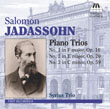 Idiomatic
performances, well recorded, in good mp3 sound. The music is
influenced by Mendelssohn and others, but has its own voice,
too. Don’t forget that one of the benefits of belonging to the
Toccata Discovery Club is a substantially discounted price for
the CD or download. Consider, too, the Tovey Piano Trios from
Toccata (see below).
Idiomatic
performances, well recorded, in good mp3 sound. The music is
influenced by Mendelssohn and others, but has its own voice,
too. Don’t forget that one of the benefits of belonging to the
Toccata Discovery Club is a substantially discounted price for
the CD or download. Consider, too, the Tovey Piano Trios from
Toccata (see below).
Hyperion have Jadassohn’s two Piano Concertos, coupled
with the Piano Concerto of Felix Draeseke (1835-1915):
Markus Becker with the Berlin Radio SO conducted by Michael
Sanderling (CDA67636) on CD or mp3 or lossless download here.
Bedrich SMETANA (1824-1884)
Piano Trio in G minor Op.15 (1855) [25:14]
Bohuslav MARTINŮ
(1890-1959) Piano Trio No.1: Cinq pièces brèves
(1930) [10:48]
Petr EBEN (1929-2007) Piano
Trio (1986) [21:10]
The Florestan Trio (Susan Tomes (piano), Anthony Marwood (violin),
Richard Lester (cello))
rec. Henry Wood Hall, London, 9-11 December 2008
HYPERION CDA67730 [57:14] – from Hyperion
(mp3 and lossless)
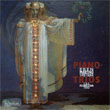 This
seems to be the month for recommendations of Piano Trios. For
further details of this recording and an appreciative review
by Dominy Clements, click here.
To compensate for the slightly short playing time, the download
in either format is offered at £6.99 instead of the usual £7.99,
so it’s excellent value, too.
This
seems to be the month for recommendations of Piano Trios. For
further details of this recording and an appreciative review
by Dominy Clements, click here.
To compensate for the slightly short playing time, the download
in either format is offered at £6.99 instead of the usual £7.99,
so it’s excellent value, too.
Modest MUSSORGSKY (1839-1881) Boris Godunov
Galina Vishnevskaya, Nicolai Ghiaurov, Biserka Cvejic, Ludovico
Spiess, Martti Talvela, Zoltan Kelemen; Sofia Radio Chorus;
Vienna Philharmonic Orchestra/Herbert von Karajan – rec. 1970.
ADD
DECCA 475 7718 [3 CDs: 68:41 + 72:24 + 70:21] – from
passionato
(mp3)
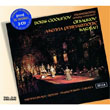 Sometimes
characterised as the ‘luxury Boris’, this is the best
of the recordings available as a download unless and until someone
makes the 5-CD Gergiev set of both versions available. Passionato
also have the 1962 Cluytens (EMI 5678812) which was highly regarded
in its day, not least for the singing of Boris Christoff – I
still have a soft spot for this, as it was the version from
which I came to know the opera. All downloads come with the
great disadvantage of being libretto-less in an opera where
the words and translation are essential for full appreciation.
As far as I am aware, only the Russian libretto, in Cyrilic,
is available online.
Sometimes
characterised as the ‘luxury Boris’, this is the best
of the recordings available as a download unless and until someone
makes the 5-CD Gergiev set of both versions available. Passionato
also have the 1962 Cluytens (EMI 5678812) which was highly regarded
in its day, not least for the singing of Boris Christoff – I
still have a soft spot for this, as it was the version from
which I came to know the opera. All downloads come with the
great disadvantage of being libretto-less in an opera where
the words and translation are essential for full appreciation.
As far as I am aware, only the Russian libretto, in Cyrilic,
is available online.
Gustav MAHLER (1850-1911)
Symphony No. 4 in G (1899-1901)
Laura Claycomb (soprano); San Franscisco Symphony Orchestra/Michael
Tilson Thomas – rec. live, 2003. DDD.
SFSO MEDIA 821936-0004-2 [62:28] – from emusic
(mp3)
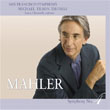 With
impeccable illogicality, eMusic placed this download in a folder
for ‘New York Philharmonic’. No, that’s the other side of the
USA! Having recently reviewed MTT’s recording of Das Lied
von der Erde, I was expecting to enjoy this recording, especially
as Tony Duggan had written in glowing terms: “Tilson Thomas
and the SFSO in Mahler go from strength to strength with a Fourth
from the grand tradition”. (See review).
After disappointments with Fischer and Maazel in this Symphony,
in last month’s Roundup, this certainly came as a welcome corrective
– and a strong challenger to Szell.
With
impeccable illogicality, eMusic placed this download in a folder
for ‘New York Philharmonic’. No, that’s the other side of the
USA! Having recently reviewed MTT’s recording of Das Lied
von der Erde, I was expecting to enjoy this recording, especially
as Tony Duggan had written in glowing terms: “Tilson Thomas
and the SFSO in Mahler go from strength to strength with a Fourth
from the grand tradition”. (See review).
After disappointments with Fischer and Maazel in this Symphony,
in last month’s Roundup, this certainly came as a welcome corrective
– and a strong challenger to Szell.
Des Knaben Wunderhorn (1892-1901)1: Revelge;
Rheinlegendchen; Lied des Verfolgten im Turme; Wer hat dies
Liedlein erdacht? Lob des hohen Verstandes; Der Schildwache
Nachtlied; Wo die schönen Trompeten blasen; Trost im Ungluck;
Des Antonius von Padua Fischpredigt; Verlorne Müh; Das
irdische Leben; Der Tamboursg’sell
Alban BERG (1885-1935) Wozzeck
– Excerpts2
Janet Baker (mezzo); Geraint Evans (baritone); London Philharmonic
Orchestra/Wyn Morris – rec.19651 ADD
Phyllis Curtin (soprano); Boston Symphony Orchestra/Eric Leinsdorf2
HIGH DEFINITION TAPE TRANSFERS HDCD144 - from HDTT
(CD, DVD or 24/96 flac)
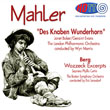 Like
the Noah Greenberg Play of Daniel (above), this version
of Des Knaben Wunderhorn was recognised as a classic
from the start, when it was issued on the Delysé label.
Its return is very welcome, since the budget-price IMP/Pickwick
reissue has gone the way of all flesh. (PCD1035 – worth looking
out for second-hand copies.) The Leinsdorf/Berg makes a strange
bedfellow – I’m afraid that Berg is not my cup of tea - but
it does make an otherwise short recording time more palatable.
The transfer is excellent: I was inclined at first to think
Evans slightly over-recorded on his loudest notes, but the 1966
Gramophone reviewer attributed this rather to his being
slightly overtaxed, which I think is the truth of the matter.
Like
the Noah Greenberg Play of Daniel (above), this version
of Des Knaben Wunderhorn was recognised as a classic
from the start, when it was issued on the Delysé label.
Its return is very welcome, since the budget-price IMP/Pickwick
reissue has gone the way of all flesh. (PCD1035 – worth looking
out for second-hand copies.) The Leinsdorf/Berg makes a strange
bedfellow – I’m afraid that Berg is not my cup of tea - but
it does make an otherwise short recording time more palatable.
The transfer is excellent: I was inclined at first to think
Evans slightly over-recorded on his loudest notes, but the 1966
Gramophone reviewer attributed this rather to his being
slightly overtaxed, which I think is the truth of the matter.
Tony Duggan, in his survey of the Mahler song-cycles – here
– also refers to what he describes as a slight glare at peaks
on the IMP/Pickwick issue so, whatever the cause, I guess it
was present on the master tapes and is ineradicable. The HDTT
website refers to Geraint Evans as ‘Germaine’ several times.
Strongly recommended, for all that.
Edward ELGAR (1857-1934)
The Kingdom, Op. 51 – Prelude (1905) [9:31]
Violin Concerto in B minor, Op. 61 (1910) [48:03]
The Dream of Gerontius – Prelude and The Angel’s Farewell
(1900) [17:21]
Thomas Zehetmair (violin); Alice Coote (mezzo); Hallé
Orchestra/Mark Elder
rec. Bridgewater Hall, Manchester, 23 March 2005 (Kingdom),
3-4 May 2008 (Concerto) and 15-19 July 2008 (Gerontius). DDD.
HALLE CDHLL7521 [74:54] – from emusic
(mp3)
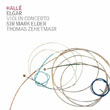 William
Hedley – here
– and Jonathan Woolf – here
– both thought this a near-miss. My first impression was a little
more favourable than theirs, but I must admit that I really
didn’t see the point of the two oratorio excerpts, when other
recordings offer more apt couplings. Still, it’s only six tracks
from eMusic – just over £1 – so it’s worth a try. eMusic also
have the Past Classics transfer of the classic Menuhin/Elgar
recording for just 3 credits – less than £1. I haven’t heard
it, so I can’t comment on the quality of the transfer, but that
remains the benchmark for all subsequent versions. All the tracks
on this Hallé recording are at 224k or 256k and the sound
is more than acceptable.
William
Hedley – here
– and Jonathan Woolf – here
– both thought this a near-miss. My first impression was a little
more favourable than theirs, but I must admit that I really
didn’t see the point of the two oratorio excerpts, when other
recordings offer more apt couplings. Still, it’s only six tracks
from eMusic – just over £1 – so it’s worth a try. eMusic also
have the Past Classics transfer of the classic Menuhin/Elgar
recording for just 3 credits – less than £1. I haven’t heard
it, so I can’t comment on the quality of the transfer, but that
remains the benchmark for all subsequent versions. All the tracks
on this Hallé recording are at 224k or 256k and the sound
is more than acceptable.
Sir Donald Francis TOVEY (1875-1940)
Bride of Dionysus Prelude (1918) [5.32] (arr.Shore/Vass)
Symphony in D Op. 32 (1913, rev. 1923) [58.03]
Malmö Opera Orchestra/George Vass
rec. Swedish Radio Studio 7, Malmö, Sweden, 27 May 2005.
DDD
TOCCATA CLASSICS TOCC0033 [63.20] – from Toccata
(mp3)
Cello Concerto, Op.40 (1935) [54:16] *
Air for strings** (arr. Peter Shore) [2:15]
Elegiac Variations, op. 25, for cello and piano (1909)
[10:11]
Alice Neary (cello); Ulster Orchestra/George Vass
Gretel Dowdeswell (piano) - rec. Ulster Hall, Belfast, 29-30
May 2006. DDD
*First modern recording; **First recording
TOCCATA TOCC0038 [67:04] – from Toccata
(mp3)
Chamber Music - Volume 1
Piano Trio in b minor op.1 (1900) [37:40]
Piano Trio in c minor op.8 Style Tragique (1908) [27:26]
London Piano Trio - rec. 27-29 August 2007, Potton Hall Studio,
Westleton, Suffolk. DDD
first recordings
TOCCATA TOCC0068 [65:06] - from Toccata
(mp3)
Piano Concerto in A, Op.15 (1903) [33:20]
Sir Alexander Campbell MACKENZIE
(1845-1935) Scottish Concerto (1897) [28:09]
Steven Osborne (piano); BBC Scottish Symphony Orchestra/Martyn
Brabbins – rec.1998. DDD
HYPERION CDA67023 [61:39] – from Hyperion
(mp3 and lossless)
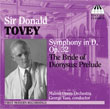 Well-crafted
music which certainly deserves more than an occasional outing.
See reviews of TOCC0033 – here
– TOCC0038 – here
– and TOCC0068 – here
– by Classical Editor Rob Barnett. The transfers, in 320k mp3,
are all very good. Peter Shore’s excellent sleeve-notes are
available, too. Incidentally, I complained recently about the
missing sleeve-notes for the Toccata Dvořák
recording, TOCC0100; I’m assured that these will soon be posted.
Well-crafted
music which certainly deserves more than an occasional outing.
See reviews of TOCC0033 – here
– TOCC0038 – here
– and TOCC0068 – here
– by Classical Editor Rob Barnett. The transfers, in 320k mp3,
are all very good. Peter Shore’s excellent sleeve-notes are
available, too. Incidentally, I complained recently about the
missing sleeve-notes for the Toccata Dvořák
recording, TOCC0100; I’m assured that these will soon be posted.
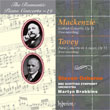 If
anything, the Hyperion (Volume 19 in their Romantic Piano
Concerto series and first recordings of both works) is even
more desirable – and the download, in mp3 and flac is only £6.99,
instead of the usual £7.99, to reflect a playing time which,
while not ungenerous, comes in at less than 65 minutes.
If
anything, the Hyperion (Volume 19 in their Romantic Piano
Concerto series and first recordings of both works) is even
more desirable – and the download, in mp3 and flac is only £6.99,
instead of the usual £7.99, to reflect a playing time which,
while not ungenerous, comes in at less than 65 minutes.
Albert ROUSSEL (1869-1937)
Suite in F [13:52]; Symphony No.3 [24:47]; Symphony No.4 [22:57]
Orchestre de l’Association des Concerts Lamoureux/Charles Munch
– rec.1965. Stereo/ADD
HIGH DEFINITION TAPE TRANSFERS HDCD206 [61:36] – from
HDTT
(24 bit/96kHz or 192kHz)
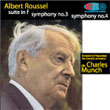 The
Roussel symphonies, minus the Suite, are also available
on Warner’s mid-price Elatus label, rather short value at 48
minutes (0927467302). Tony Haywood in his review
had some reservations about the playing and recording – and
about the playing time – but thought these the sort of performances
that come along rarely. I agree – this is something much more
special than the Berlioz – and the HDTT transfer (from an Erato
LP) does full justice to the performances. The addition of the
Suite in F – no mere makeweight but, inevitably lighter
than the symphonies – goes some way towards remedying the problem
of the playing time. Strongly recommended – it runs the Beulah
Trout Quintet a close second as my Reissue of the
Month. This is a musical and listening experience of quality:
it may even be that HDTT have got more out of the grooves of
an Erato LP than Warner’s Tonmeister have from the master-tapes.
The 96kHz download costs $14 and the 192 kHz $18. As always
with HDTT downloads, use the sample tracks to make sure that
your system can play 24/96 or 14/192 flac files.
The
Roussel symphonies, minus the Suite, are also available
on Warner’s mid-price Elatus label, rather short value at 48
minutes (0927467302). Tony Haywood in his review
had some reservations about the playing and recording – and
about the playing time – but thought these the sort of performances
that come along rarely. I agree – this is something much more
special than the Berlioz – and the HDTT transfer (from an Erato
LP) does full justice to the performances. The addition of the
Suite in F – no mere makeweight but, inevitably lighter
than the symphonies – goes some way towards remedying the problem
of the playing time. Strongly recommended – it runs the Beulah
Trout Quintet a close second as my Reissue of the
Month. This is a musical and listening experience of quality:
it may even be that HDTT have got more out of the grooves of
an Erato LP than Warner’s Tonmeister have from the master-tapes.
The 96kHz download costs $14 and the 192 kHz $18. As always
with HDTT downloads, use the sample tracks to make sure that
your system can play 24/96 or 14/192 flac files.
Ralph VAUGHAN WILLIAMS (1872-1958)
Mass in g minor (1921) [22:35]; A Vision of Aeroplanes (1956)
[9:31]; The Voice out of the Whirlwind (1947) [5:23]; Valiant-for-Truth
(1940) [5:32]; Three Choral Hymns (1929) [12:55]; Nothing is
here for tears (1936) [2:14]; The Souls of the Righteous (1947)
[3:19];
A Choral Flourish (1956) [1:42]
James McVinnie and Ashok Gupta (organ); Choir of Clare College,
Cambridge/Timothy Brown - rec. Chapel of St. John’s College,
Cambridge, UK, 16 July 2009 and Chapel of Jesus College, Cambridge,
UK, 17 July 2009. DDD
Sung texts are available at: www.naxos.com/libretti/572465.htm
NAXOS 8.572465 [63:11] – from classicsonline
(mp3)
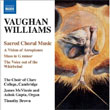 With
small reservations, William Hedley thought this a most desirable
disc – see review.
It’s not, perhaps, such an urgent recommendation as the other
Naxos/VW recording which I reviewed recently, of Dona Nobis
Pacem and Sancta Civitas (8.572424, June Roundup)
but it runs it pretty close.
With
small reservations, William Hedley thought this a most desirable
disc – see review.
It’s not, perhaps, such an urgent recommendation as the other
Naxos/VW recording which I reviewed recently, of Dona Nobis
Pacem and Sancta Civitas (8.572424, June Roundup)
but it runs it pretty close.
Sergey RACHMANINOV (1873-1946)
Symphony No.2 [60:51]
London Symphony Orchestra/Valery Gergiev – rec. live, September,
2008. DDD.
LSO LIVE LSO0677 [60:51] – from emusic
(mp3)
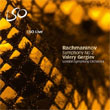 A
powerful, if rather idiosyncratic performance. It won’t be to
all tastes, though it has already received one enthusiastic
review – try it first, if you can, though it will cost you a
mere £1 if you are an emusic subscriber. Your reaction may depend
on your feelings about the complete score, as played here, against
the usual cuts, and Gergiev’s addition of a timpani thwack to
the score at the end of the first movement, which has already
drawn an adverse comment on emusic. I enjoyed it, but retain
my affection for Previn (EMI) and Rozhdestvensky (an IMP recording,
reissued on Regis RRC1210 – see review).
A
powerful, if rather idiosyncratic performance. It won’t be to
all tastes, though it has already received one enthusiastic
review – try it first, if you can, though it will cost you a
mere £1 if you are an emusic subscriber. Your reaction may depend
on your feelings about the complete score, as played here, against
the usual cuts, and Gergiev’s addition of a timpani thwack to
the score at the end of the first movement, which has already
drawn an adverse comment on emusic. I enjoyed it, but retain
my affection for Previn (EMI) and Rozhdestvensky (an IMP recording,
reissued on Regis RRC1210 – see review).
Alternatively, classicsonline have the Naxos recording conducted
by Alexander Anissimov (8.554230) and theclassicalshop and classicsonline
have Alexander Gibson’s budget Chandos recording (CHAN6606)
in the same lower price bracket. (Passionato’s price for the
Gibson is out of line with the other suppliers, as also is their
price for the Previn 3-CD set by comparison with the price of
the physical CDs.)
Havergal BRIAN (1876-1972)
Concert Overture: For Valour (1902-06)1 [13:31]
Comedy Overture: Doctor Merryheart (1911-12)2
16:07
Symphony No. 11 (1954)2 24:38
Symphony No. 15 (1960)1 22:54
RTÉ National Symphony Orchestra/Tony Rowe1;
Adrian Leaper2
Recorded in association with the Havergal Brian Society and
The Rex Foundation at the National Concert Hall, Dublin, 6 September
1993 and 27 May 1997. DDD.
NAXOS 8.572014 [77:10] – from classicsonline
(mp3) - Previously released on Marco Polo 8.223588
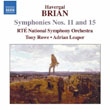 A
warm welcome for this straight reissue of a pioneering Marco
Polo recording of the music of an unconventional but unjustly
neglected composer – only at the end of his long life, following
a TV programme, did he receive anything like his due. The music
is far better than the ‘all-British wallpaper’ description with
which the BBC Music Magazine greeted the original issue and
the performances and recording – well transferred here – do
it justice. Go for the splendid Lyrita release of Symphonies
Nos. 6 and 16 first, though (SRCD.295 – see review
and November 2009 Roundup).
A
warm welcome for this straight reissue of a pioneering Marco
Polo recording of the music of an unconventional but unjustly
neglected composer – only at the end of his long life, following
a TV programme, did he receive anything like his due. The music
is far better than the ‘all-British wallpaper’ description with
which the BBC Music Magazine greeted the original issue and
the performances and recording – well transferred here – do
it justice. Go for the splendid Lyrita release of Symphonies
Nos. 6 and 16 first, though (SRCD.295 – see review
and November 2009 Roundup).
John IRELAND (1879–1962)
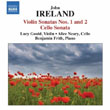 Violin Sonata No. 1 in d minor [30:26]; Violin Sonata No. 2
in a minor [27:58]; Cello Sonata in g minor [20:40]
Violin Sonata No. 1 in d minor [30:26]; Violin Sonata No. 2
in a minor [27:58]; Cello Sonata in g minor [20:40]
Lucy Gould (violin); Alice Neary (cello); Benjamin Frith (piano)
rec. Champs Hill, West Sussex, UK, 19-21 October, 2009. DDD.
NAXOS 8.572497 [79:05] – from classicsonline (mp3) (August,
2010 release)
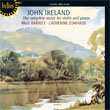 Violin
Sonata No 1 in d minor [27:58]; Berceuse [3:20]; Cavatina [2:18];
Violin Sonata No 2 in a minor [25:19]; Bagatelle [2:32]; The
Holy Boy [3:15]
Violin
Sonata No 1 in d minor [27:58]; Berceuse [3:20]; Cavatina [2:18];
Violin Sonata No 2 in a minor [25:19]; Bagatelle [2:32]; The
Holy Boy [3:15]
Paul Barritt (violin), Catherine Edwards (piano) – rec. 1995.
DDD.
HYPERION HELIOS CDH55164 [65:04] – from Hyperion
(mp3 and lossless)
The excellent new Naxos recording faces strong competition
in the same price range from the Hyperion reissue. The Hyperion
performances are slightly faster and a little more intense;
otherwise the coupling may decide your choice – the Cello
Sonata (Naxos) against shorter pieces, including the well-known
The Holy Boy (Hyperion). To complicate your choice further,
there is a recommendable 2-CD-for-1 set of Ireland’s Chamber
Music on Chandos (CHAN241-40, in mp3 or lossless here)
and an even more comprehensive 3-for-2 Lyrita set (SRCD2271,
20 tracks from eMusic – see review by Classical Editor Rob Barnett
here).
Bela BARTÓK
(1881-1945)
String Quartets: No.1 in a minor [28:16]; No.3 in C-sharp [15:19];
No.5 in B-flat [30:12]; No.2 in a minor [25:41]; No.4 in C [22:12];
No.6 in D [29:12]
Takács Quartet – rec. 1998. DDD.
DECCA 455 2972 [2 CDs: 150:50] – from passionato
(mp3)
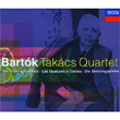 Reviewing
the recording by the Belcea Quartet (EMI 3944002, at budget
price), which he thought splendidly performed, Michael Cookson
nevertheless preferred these Takács performances by a
considerable margin – see review.
These performances now oust the Alban Berg Quartet from my collection,
by an even greater margin.
Reviewing
the recording by the Belcea Quartet (EMI 3944002, at budget
price), which he thought splendidly performed, Michael Cookson
nevertheless preferred these Takács performances by a
considerable margin – see review.
These performances now oust the Alban Berg Quartet from my collection,
by an even greater margin.
Passionato also have the Belcea set – here
– good value as a special offer at £7.99 (mp3) or £9.99 (flac)
as I write, but less appealing when they return to £15.99 and
£19.99, which is more expensive than the Takács set and
more than many online suppliers charge for the CDs.
Igor STRAVINSKY (1882-1971)
The Firebird – Suite (1945) [30:48]
Anatol LYADOV (1855-1914) Baba
Yaga, Op.56 [3:05]; Kikimora, Op.63 [7:25]; The
Enchanted Lake, Op.62 [8:32]
Nikolay RIMSKY KORSAKOV (1844-1908)
Dubinshka, Op.63 [3:57]
London Symphony Orchestra/Neeme Järvi – rec. May 1987 and
June 1988. DDD.
CHANDOS CHAN8783 [53:47] – from theclassicalshop
(mp3 and lossless)
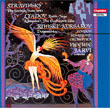 The
mp3 version of this full-price recording was Chandos’s free
gift to subscribers to their newsletter in July. The 1945 Firebird
Suite runs to almost the complete ballet, so its inclusion here
is very welcome – and it’s in appropriate company. Performances
and recording are good, though the wide dynamic range means
that the opening of the Firebird is almost inaudible
at normal levels. The mp3 transfer is faithful.
The
mp3 version of this full-price recording was Chandos’s free
gift to subscribers to their newsletter in July. The 1945 Firebird
Suite runs to almost the complete ballet, so its inclusion here
is very welcome – and it’s in appropriate company. Performances
and recording are good, though the wide dynamic range means
that the opening of the Firebird is almost inaudible
at normal levels. The mp3 transfer is faithful.
George BUTTERWORTH
(1885-1916)
Six Songs from A Shropshire Lad [12:43]; Folk Songs from
Sussex, Nos.7-11 [7:50]; Bredon Hill and other songs [14:11];
I will make you brooches [2:11]; I fear thy kisses [1:50]; Requiescat
[2:52]; Folk Songs from Sussex, Nos.1-6 [10:08]
Roderick Williams (tenor); Ian Burnside (piano) – rec. January,
2010. DDD
NAXOS 8.572426 [52:05] – from classicsonline
(mp3)
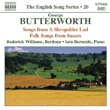 Of
the many settings of Housman’s cycle A Shropshire Lad,
Butterworth’s is, with some justification, the best known. There
are two basic approaches – the dramatic and the lyrical – and
Williams and Burnside choose mainly the lyrical. Williams doesn’t
ignore the dramatic elements, but I could wish that he gave
us a little more of them. The Sussex Folksongs are well
sung, with a (slightly twee) touch of Mummerset dialect where
appropriate and well accompanied. For all my slight reservations,
this is a most enjoyable addition to Naxos’s English Song series
– a new recording, not inherited like some of the earlier volumes
from the defunct Collins catalogue. The sound is good – I’d
have preferred something a trifle more forward – and Keith Anderson’s
notes, as usual, excellent. The lyrics are available online
here.
Of
the many settings of Housman’s cycle A Shropshire Lad,
Butterworth’s is, with some justification, the best known. There
are two basic approaches – the dramatic and the lyrical – and
Williams and Burnside choose mainly the lyrical. Williams doesn’t
ignore the dramatic elements, but I could wish that he gave
us a little more of them. The Sussex Folksongs are well
sung, with a (slightly twee) touch of Mummerset dialect where
appropriate and well accompanied. For all my slight reservations,
this is a most enjoyable addition to Naxos’s English Song series
– a new recording, not inherited like some of the earlier volumes
from the defunct Collins catalogue. The sound is good – I’d
have preferred something a trifle more forward – and Keith Anderson’s
notes, as usual, excellent. The lyrics are available online
here.
Rued LANGGAARD (1893-1952)
Music of the Spheres (Sfærernes musik) (1916-18)
[35:29] Four Tone Pictures (1917) [17:44]
Gitta-Maria Sjöberg (sop) Danish National Radio Choir Danish
National Radio SO/Gennadi Rozhdestvensky - rec. Danish Radio,
21-24 February 1996. DDD.
CHANDOS CHAN9517 [53:21] – from theclassicalshop
(mp3 and lossless)
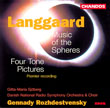 A
five-star
review from Classical Editor Rob Barnett says
it all; I need add only that the transfer is very good, even
in mp3 format. A most enjoyable recording from a composer who
is still far too little known – including by me. His total omission
from the current Penguin Guide is inexplicable. Chandos
have three other Langgaard recordings, all available to download,
and passionato also have several DaCapo recordings of his music.
A
five-star
review from Classical Editor Rob Barnett says
it all; I need add only that the transfer is very good, even
in mp3 format. A most enjoyable recording from a composer who
is still far too little known – including by me. His total omission
from the current Penguin Guide is inexplicable. Chandos
have three other Langgaard recordings, all available to download,
and passionato also have several DaCapo recordings of his music.
Carl ORFF (1895-1982) Carmina
Burana (1936)
Gundula Janowitz; Gerhard Stolze; Dietrich Fischer-Dieskau;
Deutschesoperorchester/Eugen Jochum – rec. 1967. ADD.
DEUTSCHE GRAMMOPHON ORIGINALS 447 4372 [56:06] – from
passionato
(mp3)
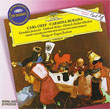 Like
Jonathan Woolf, reviewing the Marin Alsop/Naxos recording here,
this remains one of my favourite versions of the Carmina
Burana. The performance is just right – powerful where power
is called for, without being OTT – and the recording wears its
years lightly in a good transfer.
Like
Jonathan Woolf, reviewing the Marin Alsop/Naxos recording here,
this remains one of my favourite versions of the Carmina
Burana. The performance is just right – powerful where power
is called for, without being OTT – and the recording wears its
years lightly in a good transfer.
I haven’t heard JW’s other favourite, from Leitner on Arts,
but passionato also have my other favourite, another vintage
version, conducted by Frühbeck de Burgos, though, at £7.99
(mp3) and £9.99 (flac), that version is uncompetitive with the
physical CD equivalent when it was last available on EMI’s budget
Encore label. (It seems currently not to be obtainable.)
Andrzej PANUFNIK
(1914-1991)
Heroic Overture [6:58]; Symphony No.6 (Sinfonia di
Sfere) (1975) [33:48]; Landscape, for string orchestra
[8:29]; Sinfonia Sacra (1966) [25:35]
Tampere Philharmonic Orchestra/John Storgårds – rec. 2006.
DDD.
ONDINE ODE1101-5 [74:50] – from passionato
(mp3 and lossless)
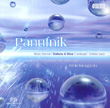 Attractive
and approachable music from a 20th-century composer
who spoke with a distinctive voice and who was not afraid to
experiment, without his music sounding unduly angular – if you
like Stravinsky and Copland, you’ll enjoy Panufnik’s music.
This performance of the Sinfonia di Sfere makes a fine
alternative to that by David Atherton on Explore EXP0014 – see
review
– which is not available as a download to the best of my knowledge.
The recording sounds fine, especially in the lossless (flac)
version.
Attractive
and approachable music from a 20th-century composer
who spoke with a distinctive voice and who was not afraid to
experiment, without his music sounding unduly angular – if you
like Stravinsky and Copland, you’ll enjoy Panufnik’s music.
This performance of the Sinfonia di Sfere makes a fine
alternative to that by David Atherton on Explore EXP0014 – see
review
– which is not available as a download to the best of my knowledge.
The recording sounds fine, especially in the lossless (flac)
version.
Einojuhani RAUTAVAARA
(b.1928)
Symphony No.7 (Angel of Light) (1994-5) [34:19]; Flute Concerto,
Op.69 (Dances with the Winds)* (1974) [21:33]; Cantus Arcticus
for birds and orchestra, Op.61 (1972) [16:55]
Petri Alank (flute)*; Lahti Symphony Orchestra/Osmo Vänskä
– rec.1992, 1995, 1999. DDD.
BIS-CD-1038 [72:47] – from passionato
(mp3 or lossless)
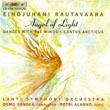 A
fine cross-section of Rautavaara’s extremely approachable yet
idiosyncratic music, very well performed and recorded and well
transferred. An ideal introduction to the work of this intriguing
composer, with the benchmark recording of the mesmerising Cantus
Arcticus rightly placed last – anything else would be an
anti-climax. Passionato have several other fine Rautavaara recordings,
mostly on the Ondine label, and classicsonline have several
Naxos recordings of his music. Sample them, including the BIS
recording of Cantus Arcticus, etc., via the Naxos Music
Library.
A
fine cross-section of Rautavaara’s extremely approachable yet
idiosyncratic music, very well performed and recorded and well
transferred. An ideal introduction to the work of this intriguing
composer, with the benchmark recording of the mesmerising Cantus
Arcticus rightly placed last – anything else would be an
anti-climax. Passionato have several other fine Rautavaara recordings,
mostly on the Ondine label, and classicsonline have several
Naxos recordings of his music. Sample them, including the BIS
recording of Cantus Arcticus, etc., via the Naxos Music
Library.
Kenneth LEIGHTON (1929–1988)
Orchestral Works – Vol. 2
Symphony No. 2 Sinfonia Mistica for soprano, chorus and
orchestra op. 69 (1973-74) [48:41]
Te deum Laudamus for soprano (or semi-chorus), chorus
and orchestra (1964-1966) [8:44]
Sarah Fox (soprano); BBC National Chorus of Wales/Adrian Partington;
BBC National Orchestra of Wales/Richard Hickox - rec. Brangwyn
Hall, Swansea, 27-28 November 2007. DDD
CHANDOS CHAN10495 [57:28] – from theclassicalshop
(mp3 and lossless)
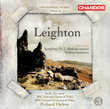 Classical
Editor Rob Barnett aptly described this as ‘sincere and undemonstrative
music not lacking in grandeur’ and welcomed the CD as one of
the last set down by Richard Hickox – see review.
The transfer sounds fine, even in mp3, and the download may
be recommended – apart from the fact that the track information
comes out in Squeezebox as gibberish. Don’t forget the Cello
Concerto and Symphony No.3 which I reviewed last
October – here
– and be aware that a new Chandos recording has just been issued,
featuring the First Symphony and the Third Piano Concerto
(CHAN10608, Howard Shelley/BBC NOW/Martyn Brabbins).
Classical
Editor Rob Barnett aptly described this as ‘sincere and undemonstrative
music not lacking in grandeur’ and welcomed the CD as one of
the last set down by Richard Hickox – see review.
The transfer sounds fine, even in mp3, and the download may
be recommended – apart from the fact that the track information
comes out in Squeezebox as gibberish. Don’t forget the Cello
Concerto and Symphony No.3 which I reviewed last
October – here
– and be aware that a new Chandos recording has just been issued,
featuring the First Symphony and the Third Piano Concerto
(CHAN10608, Howard Shelley/BBC NOW/Martyn Brabbins).
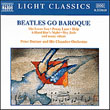 Beatles
Go Baroque
Beatles
Go Baroque
Peter Breiner Chamber Orchestra/Peter Breiner – rec? Released
2000. DDD
NAXOS 8.555010 [56:50] – from classicsonline
(mp3)
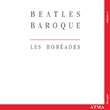 Beatles
Baroque, Volume 1
Beatles
Baroque, Volume 1
Les Boréades de Montréal – rec. 2000. DDD
ATMA ACD22218 [41:02] – from passionato
(mp3 or lossless) or classicsonline
(mp3)
Two very enjoyable arrangements of Beatles music in baroque
style; both work very well. The Naxos is the more adventurous,
with whole multi-movement Concerto Grosso arrangements
in the style of Handel, Vivaldi and Bach, whereas the Atma recording
simply arranges the music tune by tune. The Naxos has the longer
playing time, but neither is generous. Both classicsonline and
passionato offer two further volumes in the Atma series – preview
them all at the Naxos Music Library.
Geoffrey BURGON (b. 1941)
Viola Concerto Ghosts of the Dance (2008) [20:32]; Merciless
Beauty for mezzo and small orchestra (1996-97) [20:08];
Cello Concerto (2007) [22:01]
Sarah Connolly (mezzo); Philip Dukes (viola); Josephine Knight
(cello); City of London Sinfonia/Rumon Gamba - rec. Blackheath
Halls, London, 29-30 September (concertos), 22 December 2009
(Merciless Beauty). DDD
premiere recording of concertos
CHANDOS CHAN10592 [62:43] – from theclassicalshop
(mp3 and lossless)
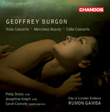 MWI
Classical Editor Rob Barnett described this as a tribute to
Burgon, the CLS principals who appear as soloists and to the
Chandos team – see review.
If you know Burgon only as the composer of TV and film music,
you ought to find echoes of what you know but in a more substantial
form here. A good transfer, especially the lossless wma (I also
sampled the mp3), completes the attraction of this as a download.
MWI
Classical Editor Rob Barnett described this as a tribute to
Burgon, the CLS principals who appear as soloists and to the
Chandos team – see review.
If you know Burgon only as the composer of TV and film music,
you ought to find echoes of what you know but in a more substantial
form here. A good transfer, especially the lossless wma (I also
sampled the mp3), completes the attraction of this as a download.
Brian Wilson












